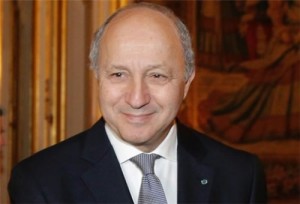 (Reuters) - France's foreign minister said on Thursday the West needed to be firm in its dealings with�Iran�over the country's nuclear program, but he was hopeful an accord could be struck this week.
(Reuters) - France's foreign minister said on Thursday the West needed to be firm in its dealings with�Iran�over the country's nuclear program, but he was hopeful an accord could be struck this week."I hope so," Laurent Fabius told�France�2 television when asked if there could be a deal. "But this agreement can only be possible based on firmness."
France�and other major powers are meeting with Tehran's representatives in Geneva this week for a third round of talks with a view to reaching a preliminary agreement on curbing Iran's nuclear program.
Iranian Supreme Leader Ayatollah Ali Khamenei said in a speech that Tehran would not step back from its nuclear rights and he had set "red lines" for his envoys in Geneva.
In the Swiss city, Iran's deputy foreign minister Abbas Araqchi said on Thursday that one such uncrossable boundary was the issue of suspending the country's uranium enrichment program.
Khamenei also called�Israel�a "rabid dog", and criticized�France, which spoke out against a draft deal floated at the November 7-9 negotiating round, for "succumbing to the United States" and "kneeling before the Israeli regime".
France has consistently taken a tough line over Iran's nuclear program, helping Paris forge closer ties with Tehran's foes in�Israel�and the Gulf.
Dismissing Khamenei's comments, Fabius said France's position had been accepted by the other five other major powers - United States,�Russia,�China, Britain and�Germany�- and that a strong stance was not just a question of defending Israel's security, but of ensuring security in the region and world.
"For now the Iranians have not been able to accept the position of the six, I hope that they will accept it."
Western governments suspect�Iran�has enriched uranium with the covert aim of developing the means to fuel nuclear weapons, which Tehran denies.
Policymakers from the six governments have said an interim accord on confidence-building steps could finally be within reach to defuse a decade-old standoff and dispel the specter of a wider Middle East war over the Islamic Republic's nuclear ambitions.
France has set four conditions for an interim deal: put all Iranian nuclear installations under international surveillance, suspend 20 percent uranium enrichment, reduce existing enriched uranium�stocks�and stop�construction�of a heavy water plant at Arak that could potentially produce weapons-grade plutonium.
"I'm not saying a deal will get done, but we are now in a process and we're entering the core of the subject," a French diplomat said. "The problem now is reconciling the red lines from both sides."
By Reuters�
The Iran Project is not responsible for the content of quoted articles










